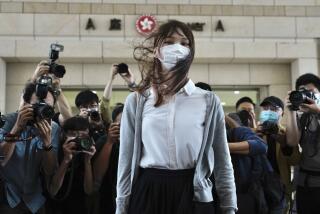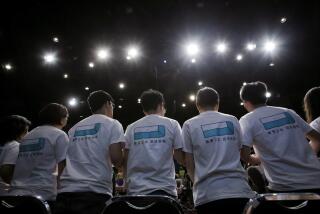From the Archives: China Dissidents Reported to Flee Via ‘Escape Tunnel’
HONG KONG -- Declaring that an underground “escape tunnel” has been established for Chinese dissidents, local and Western media sources here reported today that pro-democracy student leader Wuer Kaixi and two key Chinese intellectuals have been smuggled out of China and into this British colony.
Wuer, who emerged at the forefront of China’s crushed pro-democracy movement after criticizing China’s hard-line Premier Li Peng on government television at the height of the protests, fled to safety four days ago through the nearby Portuguese colony of Macao and then into Hong Kong, the Hong Kong Standard newspaper reported.
The 21-year-old leader from Beijing Teachers University is among 21 students on the government’s most-wanted list, which was created after the government and army suppressed the protest movement in the capital on the night of June 3-4.
The newspaper also reported that hundreds of soldiers from China’s People’s Liberation Army were moved to checkpoints near the Macao border last week.
In a separate report, the Associated Press in Hong Kong said that three other dissidents also have fled China through the “underground railroad.”
One of them is Wan Runnan, a businessman who heads an innovative Chinese computer firm and who has close links with reformers centered on former Communist Party chief Zhao Ziyang. No public charges had been leveled at Wan, but he was believed to be on a list of Zhao supporters targeted for arrest. The report said he had left for the United States.
Another is Yan Jiaqi, leader of the Beijing Independent Intellectuals Assn., which also joined in the movement. He escaped through Hong Kong and is now in France, the AP said, quoting a student activist and an unnamed diplomatic source in the colony.
The third, AP said, is Li Lu, a student from Nanjing University who is also one of the 21 student leaders being sought.
Hong Kong officials, who have allowed huge weekly demonstrations supporting the Beijing student movement and permitted the placing in a downtown park of a replica of the Goddess of Democracy statue that served as a rallying point in Beijing’s Tian An Men Square, had no official comment.
Hong Kong’s usual practice for those fleeing the Chinese mainland for the island citadel of capitalism is to seek to prevent their entry. Military and police patrols, aided by listening devices, try to catch those crossing the border. If caught, the would-be emigrants are detained--about a dozen are arrested daily--and returned to China within 24 hours.
Peace Corps Delayed
In another development, a U.S. Embassy spokesman in Beijing said this morning that China has decided to postpone the start of a U.S. Peace Corps program in China.
Twenty Americans had been due to arrive this summer to prepare to teach English at Chinese institutions in the fall. The agreement had been seen as a breakthrough marking growing friendship between the two nations.
Those ties are now strained by U.S. criticism of China’s fierce crackdown on pro-democracy protesters and by an American decision to grant refuge in the U.S. Embassy in Beijing to astrophysicist Fang Lizhi, China’s most prominent pro-democracy advocate, and his wife. The postponement of the Peace Corps program appeared to reflect these tensions.
“We got a letter from the China Education Assn. for International Exchanges (the Chinese host for the Peace Corps program), and they’ve told us that for the time being, they want to postpone the program,” U.S. Embassy spokesman Andy Koss said. “It’s not canceled. . . . We don’t know how long this will be postponed.”
Koss declined to comment on whether the action was linked to the Fang issue. “We really don’t have any indications of what’s behind it,” he said. “We just got a very straightforward note that they want to postpone it. Anything else is conjecture.”
Meanwhile, the official New China News Agency announced Monday evening that the Standing Committee of the National People’s Congress, China’s nominal legislature, will meet beginning June 29 to endorse the decisions taken by the party leadership.
In the first few days after the bloody June 3-4 crackdown that ended seven weeks of escalating pro-democracy protests, some reformist students and intellectuals in China had hoped that the National People’s Congress could serve as a power base for a reformist resurgence.
Monday’s announcement, however, made it clear that delegates to the Congress will operate under severe restrictions. “It is decided that the Standing Committee meeting will be guided by the principles adopted” at a Saturday meeting of the Party’s 170-member Central Committee, the agency reported.
The Congress, according to the report, is scheduled to:
-- Endorse the various decisions taken by the Communist Party on Saturday, including the elevation of Shanghai party chief Jiang Zemin to replace Zhao as general secretary.
-- Listen to a report on the quelling of the student-led pro-democracy protests, which are officially referred to as “the counterrevolutionary rebellion.”
-- Pass a law on rallies and demonstrations.
-- Listen to a report on the final accounting of the country’s finances in 1988.
In its campaign to push its version of events, the government invited some foreign correspondents to a tour of Tian An Men Square directed by Gen. Li Zhiyun, one of the commanders of the June 3-4 assault. Li said he had “no regrets” about any deaths and injuries inflicted during that night.
In a pair of seemingly contradictory comments, he said, as he had on a previous tour for correspondents, that “the whole process was nonviolent--no one used guns”--but also that “when our troops moved to the square we received persistent resistance.” He added: “Individuals even used guns to kill our warriors. We were forced to defend ourselves. This group of people got what they deserved.”
He agreed that some innocent people “may have been wounded” when troops battled their way to reach the square, but he said people had been warned not to go out on the streets that night.
2 Americans
Chinese authorities also took action against two Americans--one a teacher and one a student--who have been at Nankai University in the coastal city of Tianjin, east of Beijing. The two have been ordered to leave China by Friday because of alleged involvement in the recent wave of demonstrations, a U.S. Embassy spokesman said this morning.
Mark Radicia, a teacher at Nankai University, and Helen Qubain, a student there, were questioned several times by police before the expulsion order was issued, according to the embassy spokesman.
“It seems to boil down to that they were expelled for ‘disturbing social order,’ ” said Koss, the spokesman. “What it really means is they’re accused of being closely involved in the student demonstrations.”
Koss said the two came to Beijing and spoke with consular officials at the embassy on Monday. He said he did not yet have information about their ages or hometowns.
Meanwhile, an explosion aboard a train late Monday killed 20 people and seriously injured 11 in the suburbs of Shanghai.
The official New China News Agency said early today that an-on-the-spot investigation showed that the explosion, in a passenger compartment, was caused by dynamite. A Shanghai official called the incident an accident, but few other details were available.
Fineman reported from Hong Kong and Holley from Beijing.
More to Read
Start your day right
Sign up for Essential California for news, features and recommendations from the L.A. Times and beyond in your inbox six days a week.
You may occasionally receive promotional content from the Los Angeles Times.






